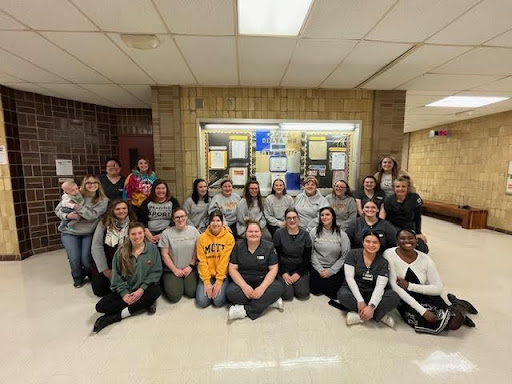Archives: News
The Organization for Associate Degree Nursing Board of Directors is proud to announce the appointment of two distinguished Public Directors: Larissa Africa, MBA, BSN, FAONL, FAAN, and Marilyn McGhee, Ph.D. “OADN is honored to welcome Larissa Africa and Dr. Marilyn McGhee to our Board of Directors. Larissa’s extensive experience as a nurse executive and her […]
OADN continues our federal advocacy on your behalf as a member of the Nursing Community Coalition, where we work to ensure that nurses are supported and that nursing education is funded. NCC Thanks Congress for Introducing a Resolution Honoring and Recognizing National Nurses Week 2024 On June 7, all sixty-four members of the Nursing Community […]

Our chapter is small but very active. Students accepted into the honor society are committed to supporting the community and our fellow students. To best meet this criterion for our chapter, we have been offering free tutoring and support services two days a week since the start of our chapter in 2019. Our idea was […]
The Vital Role of Associate Degree Nursing Programs in Supporting the Nursing Workforce Dear OADN Members: The math is simple: the United States has over 1100 associate degree nursing education programs. In 2023, these made up 44.7% (83,387) of new nursing graduates in the United States (National Council of State Boards of Nursing, […]
OADN continues our federal advocacy on your behalf as a member of the Nursing Community Coalition, where we work to ensure that nurses are supported and that nursing education is funded. 43 Senators Support FY 2025 Funding for Title VIII in Senate Dear Colleague Letter On May 14, forty-three Senators signed onto a Senate Dear […]
2024 CALL FOR NOMINATIONS: MAY 14th – JULY 15th OADN SEEKS NOMINATIONS FOR THE BOARD OF DIRECTORS AND NOMINATING COMMITTEE Dear OADN Members, Are you looking for an opportunity to share your passion for nursing education? As the only national organization exclusively advocating for community college nursing education and the associate degree pathway, OADN […]
The 2024 Foundation Scholarship, Award, and Grant deadline is June 1. These opportunities can make a major difference in the life of a nurse educator, and here is a portion of a 2023 recipient’s story. “While finishing my MSN, I was approached by a patient’s family member who said she thought I would be a […]
OADN continues our federal advocacy on your behalf as a member of the Nursing Community Coalition, where we work to ensure that nurses are supported and that nursing education is funded. NCC Sends Fiscal Year (FY) 2025 Appropriations Requests to House and Senate LHHS-ED Appropriations Subcommittees Fifty-seven members of the Nursing Community Coalition (NCC) signed […]
The Organization for Associate Degree Nursing (OADN) plays a crucial role in shaping the nursing profession, advocating for high-quality education and support for nursing students and faculty. At a recent North Carolina Associate Degree Nursing Council meeting, I had the privilege of meeting an inspiring ADN faculty member from North Carolina who exemplifies the dedication […]
